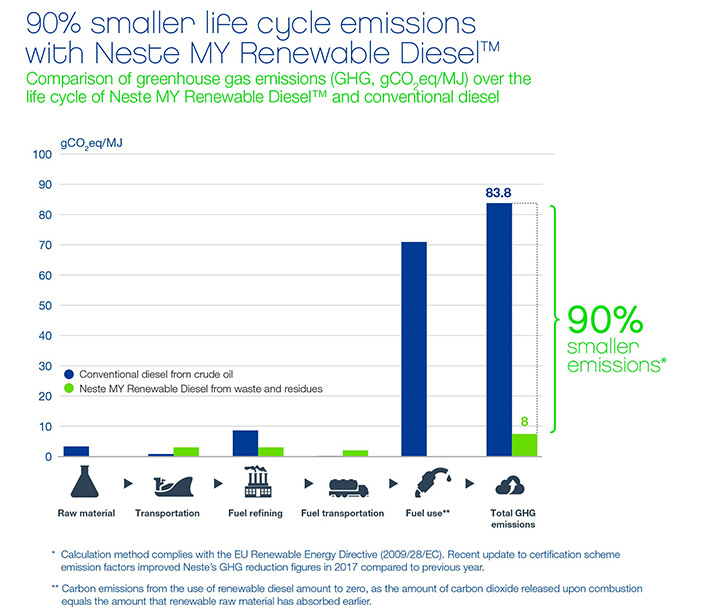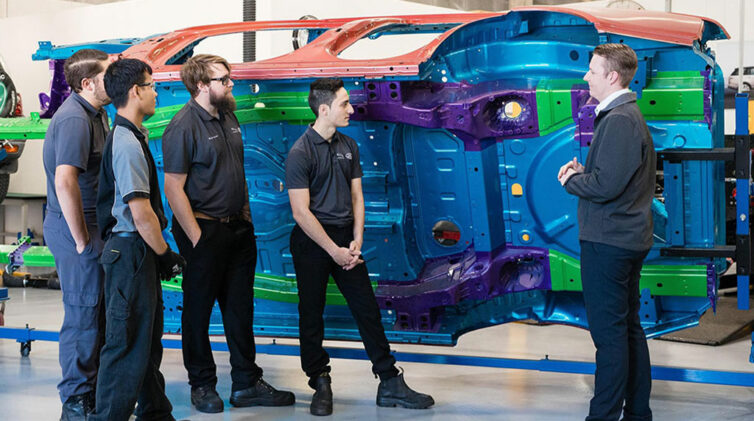It is hoped that the trials, to last up to 18 months, will lead to the construction of a fuel refinery within five years.
Southern Oil received a grant from the Queensland government that also enticed the company to shift its $25 million pilot plant and facilities to Gladstone from Wagga Wagga in NSW.

Andre Arm, Tim Rose, Annastacia Palaszczuk, Cameron Dick and Glenn Butcher Member for Gladstone Scania 4397
The plant is Australia’s first commercial-scale advanced biofuels production facility.
It is planned to produce one million litres of renewable diesel within the next three years and be a supplier to the US Navy’s Great Green Fleet initiative and the Australian Navy and be part of Air New Zealand and Virgin Australia investigations into options for locally produced aviation biofuel.
Southern Oil uses waste plastic, old vehicle tyres, agriculture and forestry waste, and biosolids to make the diesel. This is in contrast with the world’s biggest renewable diesel producer, Finnish company Neste, that makes its diesel fuel from waste animal fat and vegetable oils.
Manufacturers of renewable fuel state that the carbon emissions from the use of renewable diesel amount to zero because the amount of carbon dioxide released on combustion is equal to the amount that renewable raw materials had absorbed earlier.
Southern Oil’s trial, supported by the Queensland government’s Advance Queensland Industry Attraction Fund, involves manufacturing diesel from waste sources and then fuelling a Scania V8 test engine from a truck.
The test engine is now being used to assess exhaust emissions, performance and response, fuel efficiency, cost and engine lifetime. All will lead to Scania giving the fuel final approval for warranty coverage.
Before the warranty is secured, an estimated one million litres of the renewable diesel will be trialled at Southern Oil’s laboratory, claimed to be the leading facility of its kind in the Southern Hemisphere.
Member for Gladstone Glenn Butcher said renewable diesel could eventually be used to power heavy transport, marine and industrial applications.
“The Scania test engine is similar to diesel engines currently used in various transport modes, from fire trucks to superyachts, prime movers to cane trains,” he said.
“It’s this diversity of use that will result in the creation of new biorefineries to produce renewable diesel – bringing high-value jobs to our regions and creating new markets for our agricultural sector.
“There’s also a need for diesel generators in Queensland – especially during natural disasters – and generators using engines like this could produce enough electricity to run about 50 domestic houses, using renewable diesel.”
Southern Oil Refinery and SynBio managing director Tim Rose said Queensland is leading the country in biofutures and renewable fuels.
“We’re witnessing the first step toward proving that renewable diesel refined in Queensland from waste products can be chemically indistinguishable from petroleum-based diesel,” he said.
“Having a company like Scania endorse our fuel is crucial to creating commercial demand for our diesel and moving from pilot scale into demonstration scale.”
Scania Australia national manager (engines) Andre Arm said the company was proud to be a global leader in the shift towards a sustainable transport future.
“We have developed our heavy-duty commercial vehicle, marine and industrial engines to be able to run on a variety of renewable or alternative fuels with no loss of performance or economy, while also reducing our emissions impact,” he said.
“Scania is delighted to be a partner in the proving of this concept.”
Rival company Neste uses feedstock from 100 per cent renewable raw materials. It said it helps reduce greenhouse gas emissions by up to 90 per cent over the lifecycle of the fuel compared with fossil diesel.
“Replacing fossil fuels with Neste’s renewable fuels reduced global climate emissions altogether by a staggering 7.9 million metric tons in 2018,” the company said in a statement.
“The figure equals removal of three million passenger cars from the roads for a full year – more than the amount of cars in the city of London, UK, for example.”
By Neil Dowling
















 Read More: Related articles
Read More: Related articles

